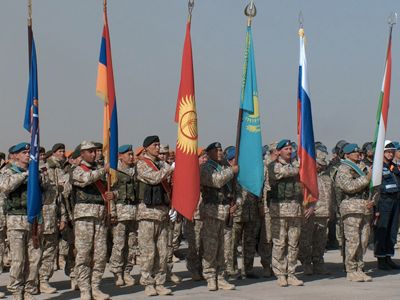
Oct 7, 2013, Thierry Meyssan
Although the French Foreign Minister, Laurent Fabius, loudly praised himself for the vote on Resolution 2118 concerning chemical weapons in Syria, this text marks both the victory of Russia and that of President Bashar al -Assad. The vote carries within itself two consequences that permanently ruin the Franco-British claims on the country.
Once past the amazement of the U.S. spinout in Syria, a new political situation is emerging corresponding point by point to plans developed jointly by Russia and Syria in June 2012, that is to say, before the Geneva 1 Conference. At the time, the Kremlin looked forward to negotiating an agreement with Washington to both solve the Syrian crisis and allow Obama to get out of his stifling huddle with Israel. But the plan, which would have become a project of shared governance in the Middle East, assumed the presence of Russian troops in Syria. General Hassan Tourekmani had proposed at the time that troops interpositioned and mandated by the United Nations be deployed by the Collective Security Treaty Organization (“Russian NATO”), since there already was a United Nations Force on Syrian soil charged with observing disengagement in the Golan.
The idea of this deployment has made headway. The CSTO signed a Protocol with the UN Department of Peacekeeping Operations in September of 2012, which allows it, as with NATO, to subcontract actions of the Security Council. Over the past year, the CSTO prepared 50,000 men who can be projected in less than two weeks. But Moscow was afraid of falling into a trap: it was in order to destroy the Red Army that the CIA created, in 1979, with Saudi Arabia, the international jihadist movement today called Al- Qaeda. Would Syria be the new Afghanistan of the Russian army?
Given U.S. hesitation, the project was stalled, but not abandoned. However, the solution to the chemical weapons crisis opens new possibilities.
First, Resolution 2118 does not just support the Russian plan to destroy the remains of the Syrian chemical program of the 80’s, it implicitly requires the maintenance of President Bashar al -Assad in power for at least one year so that he can supervise this destruction. So, not only do the major Western powers no longer demand his departure, but they now favour an extension of his mandate and a postponement of the upcoming presidential election.
Second, Syria’s transmission of the list of its chemical weapons stockpiles to the Organization for the Prohibition of Chemical Weapons (OPCW) makes them vulnerable, since this list is sure to reach “the opposition army.” Despite its efforts, the Syrian Arab Army cannot simultaneously fight international jihadists across the territory and defend its arsenals. Anticipating this situation, the heads of state of the CSTO, gathered around Vladimir Putin in Sochi on September 23 (that is to say, four days before the vote on Resolution 2118 in the Security Council), gave the order to be ready to secure the destruction of chemical weapons, should the Security Council so request. Armenian, Belarus , Kazakhstan , Kyrgyzstan , Russian and Tajikistan troops would not be deployed to intervene between the two camps as envisaged a year and a half ago, but to defend the arsenals of the state. Their task would be much simpler and more effective.
In this perspective, the 2500 men of the CSTO who must participate in maneuvers in Kazakhstan from October 7 to 11, will perform a simulation.
 Syria Support Movement solidarity with the Syrian people
Syria Support Movement solidarity with the Syrian people




